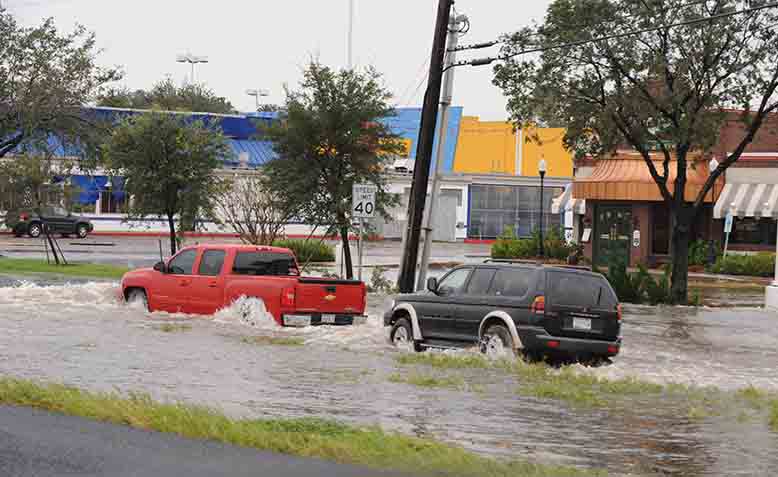 Cars going through flood water in Texas. Photo: Wikipedia
Cars going through flood water in Texas. Photo: Wikipedia
Storm Harvey was as severe as it was because of climate change, but it is capitalism that made it a disaster, argues Elaine Graham-Leigh
The obvious conclusion to draw from the devastating floods that hit Texas and Louisiana last week, killing more than 40 people, is that the US government has learned nothing from Hurricane Katrina. Unfortunately, they have; they’ve just learned the wrong lessons.
Hurricane Katrina, which killed nearly 1,500 people when it hit New Orleans in August 2005, should have been a wake-up call that climate change was real and dangerous. 2012’s Hurricane Sandy should have been a reminder. Like those previous storms, Storm Harvey can’t be said to have been caused by climate change but was undoubtedly more serious than it would have been if the climate hadn’t been warming.
Trump may believe that climate change is a Chinese hoax, but he does appear to be aware of the damage that the response to Katrina did to George W Bush. His tweets in response to Harvey have been widely criticised, rightly, for the crass way they seemed to celebrate the record-breaking nature of the storm. This stress on the unprecedented rainfall had a point, though, as a pre-emptive excuse for failures by FEMA or the state authorities. Faced with a once in a millennium event, how could they do any better?
Concentrating on the unprecedented volume of rainfall delivered by Harvey (the weather service even had to add new colours to their maps to represent it) hides how predictable this storm was. Only in June 2017, a study revealed how US cities all around the coasts are at increasing risk of devastating floods because of climate change. In Houston specifically, a professor at Texas A&M University commented that the chances of the city being hit by a disastrous storm were virtually certain: ‘it’s not if, it’s when.’
Faced with the certain prospect of a storm like Harvey, a major city like Houston could continue to be so unprepared only in the deregulated, free-market-friendly environment of private wealth and public poverty. As the storm hit, there was some discussion around whether or not the Mayor of Houston should have ordered an evacuation. In this context, evacuation doesn’t mean the authorities organising for people to leave their homes, it simply means ordering them to do so, regardless of whether they have the means to get out or anywhere else to go. As with Hurricane Katrina, an evacuation would have allowed those with the resources to escape the storm while leaving those without to face it unsupported.
This public poverty reaches beyond the immediate response to the storm to deeper questions of the infrastructure of flood-prone areas like Houston. This is a world in which unregulated new housing sprawls out into flood plains. A world in which one county had to admit at the height of the floods that they had been unable to close all the roads with dangerous flooding as budget limitations meant they had run out of barriers. A world in which chemical plants dealing with dangerous, volatile chemicals can be sited in flood-prone areas without, apparently, contingency plans to prevent explosions in the event of a power loss. At least, the fire marshals for Harris County, where the Arkema plant is located, said, the fire was unlikely to get out of control: “the facility is surrounded by water right now so we don’t anticipate the fire going anywhere”.
It doesn’t have to be this way. Part of the reason, beyond the racist assumption that Western lives are more important than Asian ones, that Harvey got so much more media coverage than the deadly floods in India, Bangladesh and Nepal, is surely the sense that in wealthy countries like the US, it should be possible to deal with expected, extreme climate events. It would be possible to mitigate the effects of heavy rainfall, design housing to be less vulnerable to flooding and help residents get out of the way when necessary, but it would be necessary to fund public authorities to do it.
Hurricane Katrina is, so far, the costliest US natural disaster at over $100 billion in property damage. The real lesson, however, is that for the corporations rebuilding and ‘regenerating’ New Orleans without so many of those pesky poor, brown people in the way, it was profitable. Within a capitalist market system, there are few levers to force the sacrifice of profit today for long term gains in the future. Forcing businesses to invest now in preventing future natural disasters which could make them money is even more difficult. A society run for the benefit of all its people would be able to live through storms like Harvey. What last week has shown is how, yet again, capitalism turns a natural event into a disaster.

